5th Floor, West Tower, World Financial Centre
1 Dong San Huan Middle Road
Chaoyang District, Beijing 100020, China
Tel: +86 10 5081 5880

September 20, 2022
CFFEX and SAIF Sign Strategic Cooperation Agreement
On August 31st, 2022, the China Financial Futures Exchange (CFFEX) and SAIF signed a strategic cooperation agreement. Guangshao Tu (Member of the CPPCC, Executive Director of the SAIF Board), Qingwen He (Secretary of the CPC CFFEX Committee, President of CFFEX), Chunhe Ye (Deputy Secretary of the CPC CFFEX Committee, Chairman of the Supervisory Board of CFFEX), Qigui Zhu (Secretary of the CPC SAIF Committee), Feng Li (Professor of Accounting at SAIF, Associate Director of CAFR), and Xuan Luo (Deputy Dean of SAIF) attended the signing ceremony. The signing ceremony was presided over by Feng Li. Guangshao Tu said that the signing reflects further deepening of cooperation between financial market organizations and financial academic institutions. Over the past ten years, SAIF has achieved remarkable results in talent training and faculty building. In the future, SAIF will deepen the construction of its think tank and further enhance its ability to serve Shanghai as an International Financial Center. Tu pointed out that the cooperation between CFFEX and SAIF is of great significance to both sides. SAIF will provide further talent and intellectual support for the reform and innovation of the financial futures market and the construction of CFFEX. He hoped that both sides would actively promote cooperation to better serve the overall national strategy and the construction of Shanghai as an International Financial Center. Qingwen He pointed out in his speech that the innovative development of financial futures need professional theories and an inclusive environment. The signing of the strategic cooperation agreement will help CFFEX further enhance the cooperation between industry and academia, integrate internal and external resources more systematically, and strengthen talent exchange. Afterwards, Chunhe Ye and Qigui Zhu signed the strategic cooperation agreement on behalf of both sides, as witnessed by Guangshao Tu and Qingwen He. In the future, the two sides will combine actual development demands and resource advantages, strengthen academic research and think tank research, collaborate on post-doctoral workstation construction and other all-around cooperation to promote the construction of Shanghai as an International Financial Center and high-quality development of the capital markets.
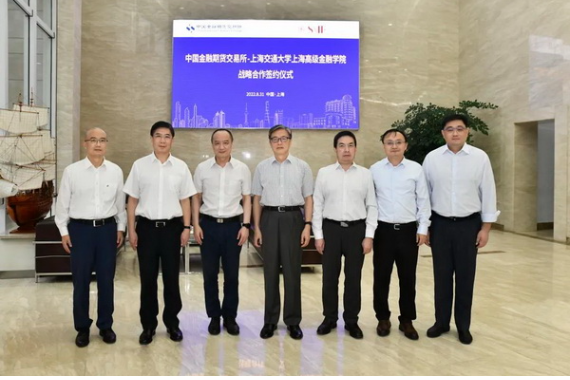
September 19, 2022
Professor Zhan Jiang’s Research Selected as 2022 SAC Key Research Program
With the imminent implementation of the registration-based IPO system in the securities market, improving the pricing efficiency of IPOs to better serve listed enterprises, stabilize the capital markets, and protect the interests of small and medium-sized investors has become an urgent research topic. Research led by Zhenying Gao (Chairman of Xiangcai Securities) and Zhan Jiang (Professor at SAIF), was recently selected as a 2022 Securities Association of China (SAC) Key Research Program. It was entitled "Empirical Research on the Pricing Efficiency of IPOs under the Registration-based IPO System". To promote the implementation of a registration-based IPO system and to better serve development of the real economy and reform of capital markets, SAC has set the research theme as "High-quality development of capital markets and the securities industry under a registration-based IPO system". SAC received a total of 476 program applications, with 183 key programs being formally approved after a comprehensive evaluation. Professor Zhan Jiang's selected program focuses on the emerging issue of IPO pricing efficiency. Taking public market data as its sample, it studies methods to improve IPO pricing and valuation scientifically and accurately through in-depth analysis of IPO pricing. "Market-based pricing mechanism and science and innovation enterprises are emerging. In this context, we hope to understand the main and difficult points in the IPO pricing by conducting this research. By forming targeted solutions and policy recommendations on IPO pricing, we hope to provide empirical references for listed companies, small and medium-sized investors as well as policy makers."Zhan Jiang said. At present, the research team jointly formed by Xiangcai Securities and SAIF is collaborating on specific issues of the study. The program is expected to be concluded in early November of this year.
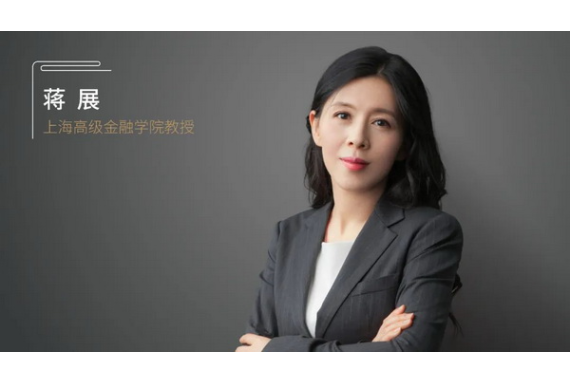
September 16, 2022
China Residents’ Investment and Financial Behavior 2022 Report Released at SAI ...
On September 1st, the 2022 SAIF Wealth Management Industry Summit and the new Release of "The Report on China Residents'Investment and Financial Management Behavior"(the Report) was held online. Professor Guangshao Tu (Member of the CPPCC, Executive Director of the SAIF Board) delivered a speech. Professor Fei Wu (Professor at SAIF) gave his analysis of the Report. Wenqiao Chang (Deputy General Manager of Puyin Wealth Management), Wenjia Lu (Deputy General Manager of the Fullgoal Fund), Lefeng Zhou (President of Xiangcai Securities), and Zhenhua Li (President of Ant Group Research Institute) had a discussion on the theme of “How can the wealth management industry improve residents'sense of fulfillment under the current situation?”. In his opening speech, Guangshao Tu pointed out that the purpose of researching residents'investment and financial behavior is to better promote the healthy and sustainable development of the residents'investment and the financial market. He said that a positive interaction between residents'behavior and the market could improve the service capacity of the investment and financial industry, accelerate the construction of the financial market, and regulate the investment and financial market. SAIF and Ant Group Research Institute could further exert their advantages for long-term sustainable research. He also expected an effective cooperative research mechanism, an open research ecology, and scientific research methods to promote the research to be developed. To study the current situation of China residents’ investment and financial management, SAIF together with Ant Group Research Institute and Ant Wealth Management Think Tank launched a questionnaire survey in 2021 and released a related report. The 2022 Report found that in terms of residents'financial health, the proportion of residents with household reserves increased to 73% from 72% last year, showing a steady increase in risk management awareness. Bank deposits, public funds, and bonds are the three assets with the highest percentage of residents'investments in 2022. Among them, the proportion of bond asset allocation is 21%, increasing by 6% (from 15% in the previous year), replacing stocks as one of the top three assets allocated by residents in 2022. The Report found that the awareness of China residents for long-term investment has increased compared to the previous year. The proportion of users who are willing to hold for less than one year has dropped significantly, from 72% last year to 65% this year. Meanwhile, residents’ tolerance for loss time of financial products has risen. Taking equity funds as an example, the proportion increased to 23% from 14% last year. In addition, residents are more rational in choosing financial products. The Report shows that investors'preference for famous fund managers has dropped significantly, from 24% last year to 14%. Investors'preference toward a fund's historical returns also declined, from 56% to 53%. Investors'concern about channel recommendations, length of closed periods, and charges have increased. Related to last year's volatile market conditions, investors are now more sensitive to professional investment advisors, liquidity, and costs. Professionalization is the key to achieving long-term investment and enhancing residents'investment and financial experience. Beyond improving residents'financial literacy, it is important for them to have access to professional services, such as buy-side investment advisory services. Research shows that 28% of investors would increase their willingness to invest for the long term due to investment advisory services, while half knew little about fund investment advisory services. Research results show that China is still in the initial stage of professional investment advisement. Professor Fei Wu said that the continuous release of the Report allows us to observe the changes in China residents'investment and financial behavior, and seek reasons. It provides a rational analysis perspective for residents to scientifically allocate investment and financial products. It also provides a reference for wealth management institutions to develop their personal and family investment business.
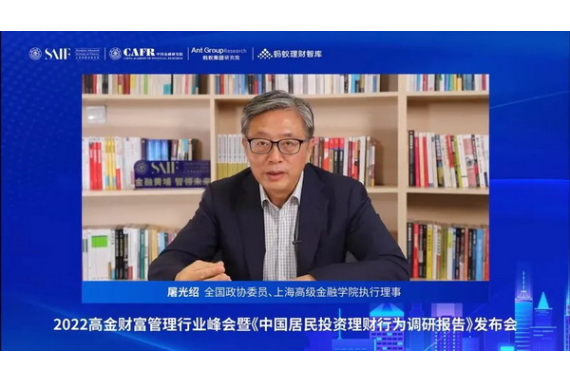
September 12, 2022
SAIF-Charles Schwab 2022 China Rising Affluent Financial Well-being Index Releas ...
On August 25th, 2022, the 2022 China Rising Affluent Financial Well-being Index was released by SAIF and Charles Schwab (a top US financial services institution), our sixth consecutive annual edition. For six years, Charles Schwab and SAIF have continued to focus on the perceptions and investment behavior of China rising affluent. This year's report focused on how affluent Chinese actively adjust their wealth management strategies when facing changing external environments. It also re-highlighted the importance of investment advisory services in advancing the financial well-being of investors. The latest 2022 report shows that the financial well-being of China's rising affluent is steadily improving. In addition, the following findings were made in this year's study. Family wealth management should be decided after a family discussion. Public awareness of retirement financial issues should be aroused through financial education and services. New products and services that better fit investment needs should be made, due to the fading of the housing market. Financial literacy education should be strengthened to help investors better identify financial risks and focus on long-term investments. Professional financial services and investment education should be provided to avoid vulnerability and to ensure long-term financial well-being. Financial institutions should further optimize personalized and high-quality services based on customers'demands. The China Rising Affluent Financial Well-being Index Initiated by SAIF and Charles Schwab, the China Rising Affluent Financial Well-being Index is now being maintained by Nielsen, an international monitoring and data analysis company. This index tracks the shifting perceptions about the financial well-being of people with annual incomes of RMB 125,000 to RMB 1,000,000 and with investable assets of less than RMB 7,000,000. These investors are an increasingly influential cohort within both the Chinese and global economies. The index is derived from the combined assessment of four sub-indexes, namely: wealth confidence, financial planning, asset management, and investment engagement.
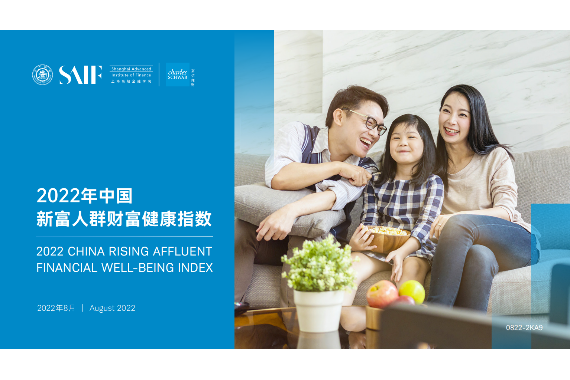
September 09, 2022
Forum Held at SAIF on the Promoting of Shanghai as an International Financial Ce ...
On the afternoon of August 22nd, 2022, a forum on the project for amending the "Regulations on Promoting the Construction of Shanghai as an International Financial Center (Regulations)"was held at SAIF. Leaders and scholars attending the forum included: Zhuoqing Jiang (Director of the Standing Committee of the Shanghai Municipal People's Congress), Guiyu Xiao (Deputy Director of the Standing Committee of the Shanghai Municipal People's Congress), Guangshao Tu (Member of the CPPCC, Executive Director of the SAIF Board), and KuiLing Ding (Academician of the Chinese Academy of Sciences, Executive Vice President of SJTU). In the beginning, Guangshao Tu mentioned that SAIF was established in 2009 by SJTU to realize the national strategy of building Shanghai as an International Financial Center. In the past thirteen years of rapid development, SAIF gradually gathered together a group of international first-class faculty and designed outstanding curriculum programs. In the future, SAIF will continue to strive for international excellence in talent training, faculty strength and digitalization, while building SAIF Think Tank to serve the construction of Shanghai International Financial Center. Regarding the revision of the Regulations, Guangshao Tu said that the proposed draft met the latest needs of national financial development and strengthened financial support for the real economy —especially science and technology innovation, digital economy, and green development. He also suggested that the Regulations should pay attention to digital finance and financial technology, and should refine the business environment for the financial center. Guiyu Xiao also stressed the importance of external expert opinions. Liu Dai (Member of the Shanghai Financial and Economic Affairs Committee) put forward four "new"matters, namely: new objectives, new requirements, new expectations, and new guarantees. Dong Xie (Director of the Shanghai Municipal Financial Regulatory Bureau) exchanged his views on the progress of the revision of the Regulations, and solicited opinions on specific regulations. Professor Feng Li (Professor of Accounting, Associate Director of CAFR, Co-Director of SAIFR) reported on the suggestions of the revision of the Regulations and other experts also shared their opinions during the discussion session. Afterwards, Zhuoqing Jiang made a concluding speech. He appreciated the development achievements made by SAIF over the past ten years and recognized SAIF Think Tank construction in the development of Shanghai as an International Financial Center. He hoped that through this revision of the Regulations, the SAIF Think Tank would continue to offer pragmatic strategies on the practical issues faced in the deepening of reforms and the opening up of the economic and financial fields.
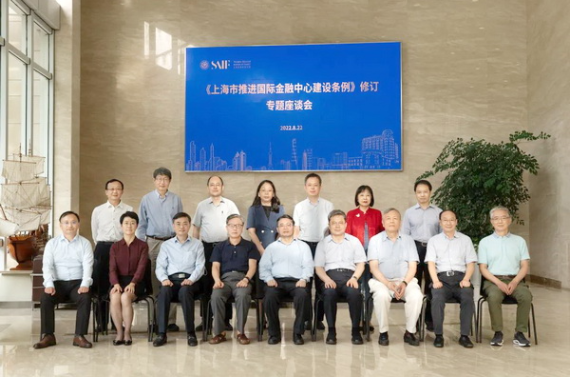
September 07, 2022
MoU on Dual Degree Signed by SAIF and Haas School of Business, UC Berkeley
Recently, SAIF and the Haas School of Business at the University of California (UC Berkeley) signed a memorandum of understanding on a dual degree for the Master of Financial Engineering Program (MFE). The program has no limit on the number of participants, and students of the SAIF MF Program can submit applications after enrollment. Upon graduation, they will be awarded a Master's degree and the academic certificate of SJTU, the academic certificate of SAIF, and a Master's degree from UC Berkeley. As the flagship program of SAIF, the MF Program cultivates future leaders in the financial industry. It adopts an international and open teaching mode while featuring first-class faculty from world-class universities. In 2019, to meet the development needs of the financial industry, the SAIF MF program was the first to offer a Master's education program with a FinTech track in China. The first batch of FinTech track graduates has since achieved a 100% employment rate. The MFE Program of UC Berkeley benefits from the top financial research resources of the Hass School of Business, which effectively combines modern portfolio theory with computational methods. The program is known globally for its 98% employment rate (Fall 2021) and prestigious curriculum. It is ranked at the top in the 2022 TFE Times Financial Engineering Program Rankings. In addition to the dual degree program with the Hass School of Business, SAIF has also cooperated with top institutions in North America and Europe, such as Columbia University and the London School of Economics and Political Science (LSE). As of 2021, more than 40 SAIF MF students have applied to participate in the dual degree program.
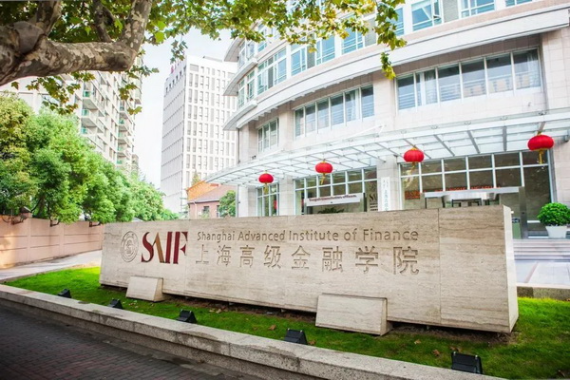
September 05, 2022
Metaverse Study by SAIF and SWS Research Released
On August 8th, 2022, the report "Metaverse Study: Technology, Applications and Economic Paradigms"was officially released. The report is co-authored by SAIF, CAFR, and the Shanghai Shenyin Wanguo Securities Research Institute Ltd. (SWS Research). The report comprehensively analyzes the new track of the metaverse and the metaverse economy from four aspects: definition and connotation, core technologies, application scenarios, and overseas metaverse economy paradigm. According to the report, the metaverse is a next-generation Internet application and social civilization that integrates a number of new technologies, with digital sensing and blockchain technology as its core. It is generated through a change of identity interaction and an economic paradigm change. The metaverse economy is a series of new economic production and business operation models based on digital production, distribution, exchange, and consumption. The definition, underlying technologies, application scenarios, and business models of the metaverse are still at an early stage. This report helps with the construction of a relevant policy system and a layout of industrial practice, and with the implementation of digital economy strategy. The report also included several SAIF GES alumni and four GES alumni companies (Shanghai Zhiwang Information Technology Co. Ltd., Shanghai Jianjing Shurui Data Technology Co. Ltd., Bowei Technology Co. Ltd., Shanghai Xianhu Investment Management Co. Ltd.), as well as experts and researchers from the Tsinghua University School of Journalism and Communication.
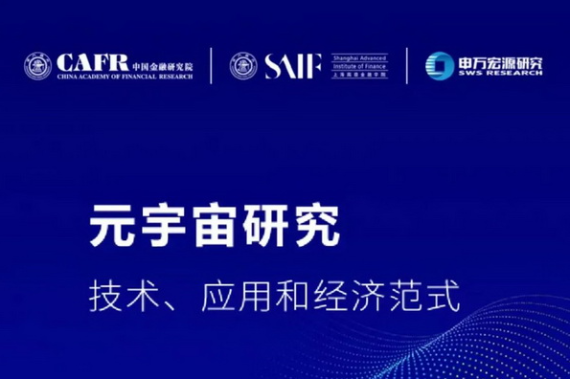
September 01, 2022
SAIF-Zijiang Workshop Forum Inaugurated Online
Recently, the first SAIF-Zijiang Workshop forum was inaugurated online. It was jointly sponsored by SAIF and the Shanghai Zijiang Foundation. It was co-organized by the SAIF Sustainable Investment Research Center and by the Responsible Financier Club of the SAIF MBA Academic Association. Minxue Kan (President of the Responsible Financier Club of the SAIF MBA Academic Association, student of the SAIF Part-Time MBA Class of 2021), was the moderator of this forum. Focused on "Social Responsibility and Financial Value Creation in the Post-Epidemic Era", experts, scholars and industry elites in CSR and finance were invited. They discussed effective ways to contribute to the sustainable development for global society and the economy, and to spread the sustainable development concept. Professor Hong Yan (Professor of Finance, Deputy Dean for Faculty and Research, GES Program Academic Director at SAIF, Director of the China Hedge Fund Research Center) delivered a welcome speech. He said that finance should shoulder more responsibility as an essential role in promoting high-quality development, and that SAIF is constructing a Sustainable Investment Research Center in accordance with China's current sustainable development strategy. He also expressed his gratitude to the Zijiang Foundation for its support for SAIF, especially for its help in the construction of the Responsible Financier Club. Chen Lin, Secretary General of the Shanghai Zijiang Foundation, affirmed the cooperation in talent training between the Zijiang Foundation and SAIF in the past four years. She also said that Zijiang would continue to work with SAIF to contribute to the construction of Shanghai as an International Financial Center in terms of discipline construction, talent training, and responsible education. In the keynote speech, Yu Meng (Executive Vice President and Chairman of Asia Pacific at Franklin Templeton) gave a speech on "Approaches to Climate Change — Climate Risk Disclosure and Carbon Pricing"from the perspective of asset management and capital markets. Xubei Luo (Senior Economist of the World Bank Group) shared her views on "Extreme Poverty Eradication and Sustainable Development". In the discussion session, guests exchanged their views on the connotations of sustainable development, the relationship between economic and social benefits, the development direction of family offices, and the future development path of sustainable finance. These guests included: Tan Wang (Professor of Finance, MF Program Academic Director at SAIF), Shuo Qin (Founder of Chin @ Moments), Lyuzhi Ye (Head of AVPN China), and Xing’an Pan (Investment Director and General Manager of Family Office at Yunnan International Trust Co.).
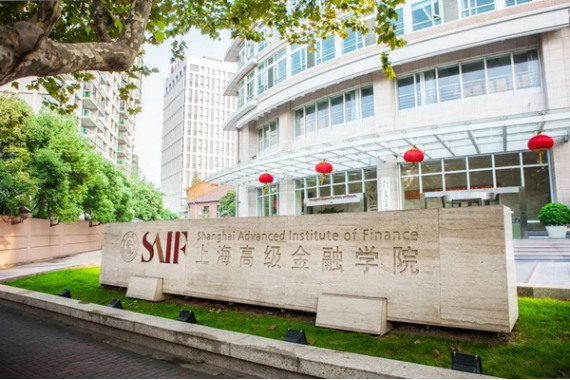
August 12, 2022
2022 Summer Institute of Finance (SIF) Held
On July 11th – 12th, 2022, the 12th Summer Institute of Finance (SIF) was successfully held. SIF was organized by the Shanghai Advanced Institute of Finance (SAIF) and the China Academy of Financial Research (CAFR) at Shanghai Jiao Tong University (SJTU). Due to the COVID-19 pandemic, the SIF conference was held online. During the conference, more than 70 scholars, professors, and researchers from top universities and financial institutions from around the world discussed cutting-edge topics in current financial research. Professor Hong Yan (Professor of Finance, Deputy Dean for faculty and research at SAIF) chaired the SIF, and Professor Nengjiu Ju (Professor of Finance, Academic Director of the Ph.D. Program at SAIF) was Chairman of the Paper Review Committee. Other SIF participants included: Professor Yurong Hong (Assistant Professor of Finance at SAIF), Professor Jun Li (Assistant Professor of Finance at SAIF), Professor Jun Pan (SAIF Chair Professor), Professor Hui Chen (Special-Term Professor of Finance at SAIF, Nomura Professor of Finance at the MIT Sloan School of Management), Professor Kewei Hou (Special-Term Professor at SAIF, Ric Dillon Chair Professor in Investment at Ohio State University), Professor Liyan Yang (Visiting Research Professor of SAIF, Peter L. Mitchelson/SIT Investment Chair Professor at Rotman School of Management, University of Toronto), and Professor Huibing Zhang (Special-Term Professor at SAIF, Professor of Finance, University of Texas). This year's SIF received a large number of submissions, with a total of 635 valid academic papers from all over the world, of which 12 papers were finally selected by the Paper Review Committee. These 12 papers were presented in six academic sessions, focusing on themes of: “Corporate Decision Making under Constraints”, “Pricing Polar Assets on the Risk Spectrum”, “Peer Effects: Conflicting vs Complementing”, “Anomalous Asset Pricing”, “Individual Decision Making under Fintech Adoptions”, and “Debt Financing Structure: Lenders vs Instruments”. During the conference, professors and Ph.D. students from various universities in China (and beyond) read or reviewed the papers, and 12 scholars shared their latest research findings. Their research issues included: “The Shadow Cost of Collateral”; “How Does Declining Worker Power Affect Investment Sensitivity to Minimum Wage?”; “Value Premium, Network Adoption, and Factor Pricing of Crypto Assets”; “The Convenience Yield, Inflation Expectations, and Public Debt Growth”; “Social Ties and Peer Effects in Crowdfunding Markets”; “Conflicts in Private Family Firms”; “Closing Pressure, Predatory Trading, and the Negative Oil Price”; “Extrapolation and Risk-Return Trade-offs”; “Mind the App: Mobile Access to Financial Information and Consumer Behavior”; “FinTech Adoption and Household Risk-Taking”; “The Cost of Intermediary Market Power for Distressed Borrowers”; and “Monetary Policy, Debt Structure and Credit Reallocation”. At the conference, each paper was reviewed by an individual scholar. Each made pertinent suggestions and comments on research content, ideas, and methodologies. In addition, there was a Q&A session in which scholars and professors made comments and discussed issues with the paper presenters and reviewers. The open and professional academic atmosphere at SIF was inspiring and beneficial for scholars hoping to optimize their current research.
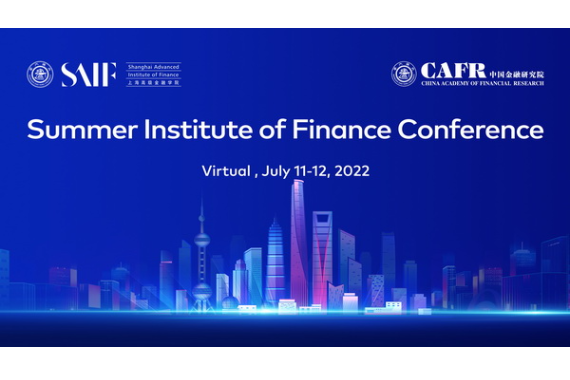
July 12, 2022
2022 China International Conference in Finance (CICF) Held
On July 6th – 8th, the 19th China International Conference in Finance (CICF) was successfully held. Due to the COVID-19 pandemic, the CICF conference was held online. According to statistics, this year's number of registered attendees reached a record high of 1,313. CICF was founded in 2002 by the Sloan School of Management at the Massachusetts Institute of Technology. This year's CICF was hosted by SAIF. Professor Jiang Wang (Chair Professor in Management at MIT Sloan School, Senior Advisory Visiting Professor, Chair of Academic Council at SAIF) chaired the conference. Professor Zhiguo He (Fuji Bank and Heller Chair Professor in Finance at the University of Chicago, Booth School of Business) chaired the paper review committee, and Professor Kewei Hou (Ric Dillon Chair Professor in Investment at Ohio State University, Fisher College of Business) co-chaired the Paper Review Committee. Professor Shijun Cheng (Executive Dean, Professor of Accounting at SAIF) attended the conference and delivered a speech. ProfessorLars Peter Hansengave a keynote speech entitled "How Should Climate Change Uncertainty Impact Social Valuation". He is the David Rockefeller Distinguished Service Professor at the Booth School of Business at the University of Chicago and is the winner of the 2013 Sveriges Riksbank Prize in Economic Sciences in Memory of Alfred Nobel. This year, 1,644 valid submitted papers were received from 2,660 participants, and a total of 280 papers were selected. The authors of the selected papers are mostly professors and PhD students from major business schools around the world. Researchers from various financial institutions and regulatory authorities were also included. The conference lasted for three days and featured 70 sessions, during which 37 of the 280 papers presented and reviewed focused on China's financial markets. They provided a unique perspective on the opportunities and challenges of China's financial development. In this year's CICF, SAIF showed its outstanding academic influence with a large number of papers by its own faculty and Ph.D. students being admitted. In addition, multiple SAIF professors chaired different sessions or reviewed the papers at CICF. Reviewed by the Best Paper Review Committee, seven papers were awarded the CICF Best Paper Award, Xia Yihong Best Paper Award, and Xiyue Best Paper Award (respectively). A full list of the awards is as follows. CICF Best Paper Award: “Creating Controversy in Proxy Voting Advice”co-authored by Andrey Malenko, Nadya Malenko, and Chester Spatt “Hot Off the Press: News-implied Sovereign Default Risk” co-authored by Chukwuma Dim, Kevin Koerner, Marcin Wolski, and Sanne Zwart “Sustainability or Performance? Ratings and Fund Managers’ Incentives” co-authored by Nickolay Gantchev, Mariassunta Giannetti, and Rachel Li Xia Yihong Best Paper Award: “Debt Maturity Management” co-authored by Yunzhi Hu, Felipe Varas, and Chao Ying “Do Preemptive Rights Effectively Protect Minority Shareholders? Evidence from Chinese Listed Firms” authored by Zhongzhi Song Xiyue Best Paper Award: “Extrapolative Market Participation” co-authored by Wanbin Pan, Zhiwei Su, Huijun Wang, and Jianfeng Yu “Do Mutual Funds Walk the Talk? A Textual Analysis of Risk Disclosure by Mutual Funds” co-authored by Jinfei Sheng, Nan Xu, Xian Gu, and Lu Zheng
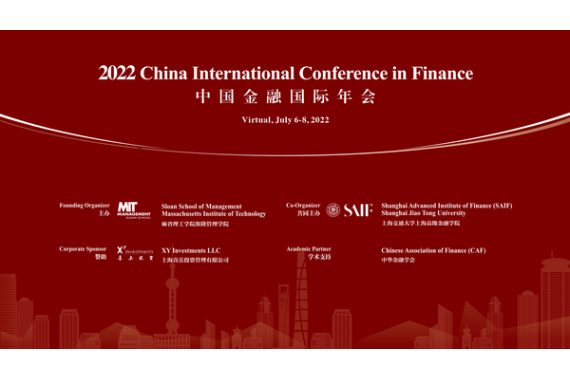

211 West Huaihai Road
Shanghai 200030, China
Tel: +86 21 6293 3500
9th Floor, Building T6, Hongqiao Hui
990 Shenchang Road
Shanghai 201106, China
3rd Floor, Building D, Chenfeng Building
800 Tongpu Road
Shanghai 200062, China
5th Floor, West Tower, World Financial Centre
1 Dong San Huan Middle Road
Chaoyang District, Beijing 100020, China
Tel: +86 10 5081 5880
1203 Tower 7, One Shenzhen Bay
Nanshan District, Shenzhen 518000, China
Tel: +86 755 8663 8815
© Shanghai Advanced Institute of Finance All Rights Reserved.


Top